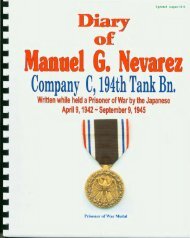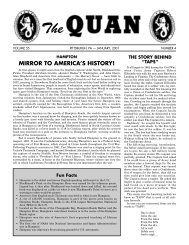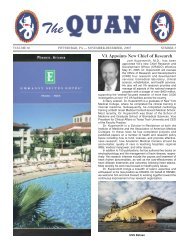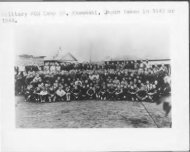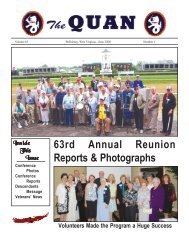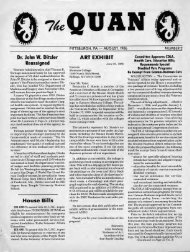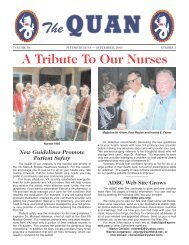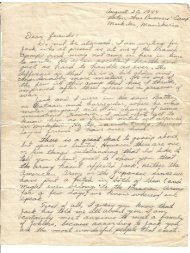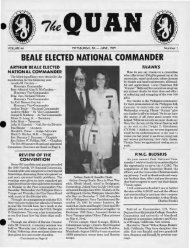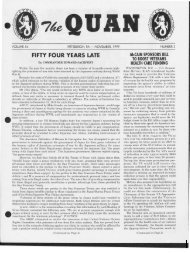June/July 2002 - Philippine Defenders Main
June/July 2002 - Philippine Defenders Main
June/July 2002 - Philippine Defenders Main
You also want an ePaper? Increase the reach of your titles
YUMPU automatically turns print PDFs into web optimized ePapers that Google loves.
New CHAMPVA Regulations<br />
Published in Federal Register<br />
WASHINGTON — Regulations that<br />
bring several improvements to the<br />
Civilian Health and Medical Program of<br />
the Department of Veterans Affairs<br />
(CHAMPVA) were published in the<br />
Federal Register recently.<br />
“I am very happy VA can provide improved<br />
financial protection for families of<br />
disabled veterans against the effect of an<br />
injury or long-term illness,” said Secretary<br />
of Veterans Affairs Anthony J. Principi.<br />
The new rules will bring financial relief<br />
to CHAMPVA beneficiaries and extend<br />
benefits to older survivors and dependents<br />
of some disabled or deceased veterans<br />
who face medical expenses not paid<br />
by Medicare or other third-party payers.<br />
One improvement, called “CHAMPVA<br />
for Life,” actually began in October. It is<br />
designed favor spouses or dependents who<br />
are 65 or older. They must be family members<br />
of veterans who have a permanent<br />
and total service-connected disability, who<br />
died of a service-connected condition or<br />
who were totally disabled from a serviceconnected<br />
condition at the time of death.<br />
They also must have Medicare coverage.<br />
“CHAMPVA for Life” began paying benefits<br />
for covered medical services four<br />
months ago to eligible beneficiaries who are<br />
65 or older and enrolled in Medicare Parts<br />
A & B. “CHAMPVA for Life” benefits are<br />
payable after payment by Medicare or other<br />
third-party payers. For services not covered<br />
by Medicare or other insurance, such as<br />
outpatient prescription medications,<br />
CHAMPVA will be the primary payer.<br />
CHAMPVA beneficiaries who reached<br />
age 65 as of <strong>June</strong> 5, 2001, but were not<br />
enrolled in Medicare Part B on that date,<br />
will be eligible for this expanded benefit<br />
even though not enrolled in Medicare Part<br />
B. There is no change in CHAMPVA coverage<br />
for those beneficiaries 65 and older<br />
who do not qualify for Medicare.<br />
In addition, the regulation will reduce<br />
the catastrophic cap, or amount of out-ofpocket<br />
expenses for CHAMPVA beneficiaries.<br />
Under the new rule, CHAMPVA will<br />
pay 100 percent of allowable medical<br />
expenses after a beneficiary reaches<br />
$3,000 in out-of-pocket expenses, a reduction<br />
from $7,500.<br />
People can request an application by<br />
writing to the VA Health Administration<br />
Center (HAC), P.O. Box 469028, Denver,<br />
CO 80246-9028.<br />
To be eligible for CHAMPVA, people<br />
must be family members of veterans who<br />
have a permanent and total service-connected<br />
disability, who died of a serviceconnected<br />
condition or who were totally<br />
disabled from a service-connected condition<br />
at the time of death.<br />
Updates about CHAMPVA are posted<br />
on VA’s Health Administration Center<br />
Web site at www.va.gov/hac.<br />
————————<br />
18 — THE QUAN<br />
QUAN Origin<br />
Dear Joe:<br />
I read the letter from CWO Stephen<br />
Watson in the April <strong>2002</strong> issue of QUAN<br />
in which he mentioned the confusing word<br />
QUAN. I was born and raised in Manila,<br />
where the predominant dialect is Tagalog.<br />
I might be able to throw some light on the<br />
subject.<br />
First of all, many years ago at a national<br />
ADBC convention, I was in a group of<br />
ex-POWs who spent time at O’Donnell<br />
and/or Cabanatuan and we were discussing<br />
the word QUAN. they felt that the<br />
word originated at the mess hall where<br />
the cooks were concocting a conglomerate<br />
of items in one big pot. It contained rice,<br />
“camote” (sweet yams), mongo beans,<br />
“kangkong” (a green leafy vegetable), and<br />
all kinds of items thrown in.They did not<br />
know what to call it. So they called it<br />
QUAN, as derived from the Tagalog word<br />
“Kwan”. Apparently, they heard it from a<br />
Filipino who mentioned the word casually.<br />
This word must have been the idea originated<br />
by the editor or publisher of the<br />
ADBC magazine when it started. That<br />
was a close interpretation of the word<br />
QUAN.<br />
Another version is the one give to me by<br />
my wife Marge, from Montana, who also<br />
lived in California for many years before<br />
we met and got married. She said that if<br />
one wanted to use a word without any<br />
description, he would say, “Give me that<br />
gizmo,” or “whatyoumacallit.” This is the<br />
closest version to the Tagalog word<br />
“Kwan.” In Tagalog, if we want to say<br />
something and don’t know the word, we<br />
just say, “Yung ban kwan,” or “That<br />
gizmo.” I hope that this will satisfy Mr.<br />
Watson or any reader of our magazine.<br />
Sincerely,<br />
Mariano “Mario” Villarin<br />
————————<br />
Support the Nimitz Museum<br />
Dear Mr. Vater,<br />
In the Nov. 2001 issue of The QUAN,<br />
there was a letter from Larry L. Pangan,<br />
discussing the valiant effort made by the<br />
troops in the <strong>Philippine</strong>s after Pearl<br />
Harbor. There are not many people who<br />
realize the significance of holding off the<br />
Japs for four months on Bataan and<br />
another month on Corregidor. Without<br />
this gallant effort, Australia would<br />
undoubtedly have fallen, and WW2 would<br />
have been a different story. Larry’s letter<br />
does an excellent job of outlining the<br />
whole situation.<br />
Very little notice is made of the decision<br />
of Maj. Gen. Edward P. King Jr. (my stepfather)<br />
to DISOBEY MacArthur’s order to<br />
fight to the last man. Ned realized that<br />
the sacrifice of some 75,000 men would<br />
accomplish nothing militarily, so cut off<br />
communications with Gen. Wainwright, so<br />
that he wouldn’t have to share in the decision<br />
to surrender. MacArthur never spoke<br />
to Gen. King again because of the surrender.<br />
It is interesting to note that Pres.<br />
Truman fired MacArthur “for disobeying a<br />
direct order.”<br />
If indeed Gen. King had “fought to the<br />
last man” as ordered, Gen. Wainwright<br />
could never have surrendered on Corregidor<br />
— there would have been no<br />
Bataan Death March, Camp O’Donnell,<br />
Cabanatuan, Hell Ships, slave labor, etc.<br />
He made the right decision as you survivors<br />
are here to tell about it.<br />
I have just returned from a visit to The<br />
Nimitz Museum. My WW2 outfit, the 11th<br />
Armored Div., of Patton’s Third Army, had<br />
a regional meeting there. I know that you<br />
will be going there in May for your annual<br />
gathering, and encourage you to continue<br />
supporting this museum with your historical<br />
documents.<br />
Yours truly,<br />
Barrington K. Beutell<br />
————————<br />
Congress of the United States<br />
House of Representatives<br />
Washington, DC 20515<br />
April 9, <strong>2002</strong><br />
Mr. Earl Szwabo<br />
1445 Keeven Lane<br />
Florissant, Missouri 63031<br />
Dear Mr. Szwabo:<br />
Thank you for writing to express your<br />
support for allowing military retirees with<br />
compensable disabilities to receive their<br />
full military retiree pay and full compensation<br />
for service-related disabilities.<br />
Please accept my apology for the delay in<br />
responding.<br />
I have given a good deal of thought to<br />
the issue of concurrent receipt. The idea<br />
that military retirees, alone among the<br />
various groups of Federal retirees, should<br />
forego their Department of Veterans<br />
Affairs compensation, makes little sense.<br />
Accordingly, I am a cosponsor of Rep.<br />
Bilirakis’ legislation (H.R. 303), which<br />
would amend current law to allow concurrent<br />
receipt of both military retiree pay<br />
and disability compensation.<br />
How to fund concurrent receipt has<br />
always been the main issue. My hope was<br />
that with most military health care matters<br />
resolved in the fiscal year 2001<br />
defense bill, and given the House and<br />
Senate Armed Services Committee’s support<br />
for the program, that the President<br />
will include funding for concurrent receipt<br />
in his soon-to-be-released fiscal year 2003<br />
budget request. That proved not to be the<br />
case. I will support its inclusion in the<br />
defense bill this year.<br />
If you have any additional thoughts or<br />
concerns about this or any other topic,<br />
please do not hesitate to write or call.<br />
Sincerely,<br />
W. Todd Akin<br />
Member of Congress<br />
————————



